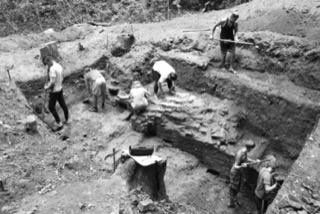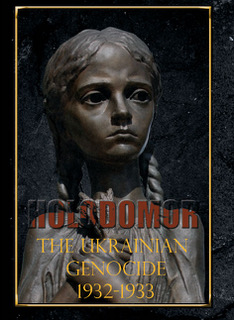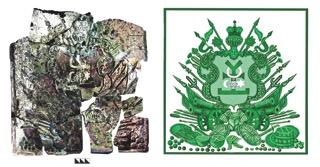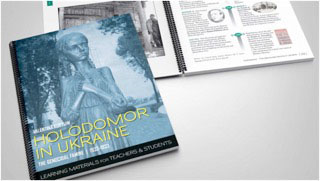|
 |
Home
» Science and Education Science and Education
10.10.2023
n 17 June 2023, Professor Paul Robert Magocsi, University of Toronto, was elected to the Polish Academy of Arts and Sciences in Cracow, Poland. The election was confirmed by the President of the Republic of Poland on 1 August 2023. Previously, Professor Magocsi was elected to the Academy of Humanities and Social Sciences- Royal Society of Canada (1994, and was awarded honorary doctorates/professorships from Presov University in Presov, Slovakia (2013) and the Ivan Ohiienko University in Kamianets-Podilskyi (2016), the oldest Ukrainian language... |
Detailed...
|
21.03.2023
HREC’s Conquest Prize in Holodomor Studies has been awarded to Dr. Oksana Kis for her article "Women’s Experience of the Holodomor: Challenges and Ambiguities of Motherhood,” published in Journal of Genocide Research(2021). The prize is awarded on a biennial basis to the author of an outstanding article that contributes to a fuller understanding of the Holodomor. Oksana Kis is a historian and anthropologist with expertise in Ukrainian women’s history, feminist anthropology, oral history, and gender transformations in post-socialist countries. Historian Lynne Viola, a member of the Prize jury, commented, “Professor Kis has written a truly ground-breaking article on the Ukrainian famine. Her work is among the few to explore women’s experiences during the Holodomor. Her interdisciplinary approach makes this article a contribution of the highest order.”... |
Detailed...
|
08.02.2022
An attempt to throw off course the study of Ukraine’s Holodomor-Genocide of 1932-1933 is under way with a clear participation of adversarial actors whose aim seems to be to sow confusion, obfuscate and compromise the issue. Clearly, the main adversarial actor on the issue of the Holodomor has always been Russia – whether Soviet or post-Soviet. When the Soviet Union collapsed in 1991, Moscow finally acknowledged that there was a famine in the USSR in the 1930s – but continues to this day to deny the Ukrainian Holodomor-Genocide of 1932-1933... |
Detailed...
|
11.05.2021
 This attractive and colourful publication is the ninth annual booklet in a series (2011-20) devoted to the archaeological and historical research of Baturyn, Chernihiv Oblast, Ukraine. The town was one of the capitals of the Cossack state, or Hetmanate, and is remarkable for its glorious and tragic history. This publication is recommended for both scholars and general readers interested in Ukrainian antiquities. Since 2001, the Canada-Ukraine project for the study of the history and culture of early modern Baturyn has been sponsored by the Canadian Institute of Ukrainian Studies (CIUS) at the University of Alberta, the Pontifical Institute of Mediaeval Studies at the University of Toronto, and the Ucrainica Research Institute in Toronto. This project is affiliated with The Peter Jacyk Centre for Ukrainian Historical Research at CIUS Toronto Office... This attractive and colourful publication is the ninth annual booklet in a series (2011-20) devoted to the archaeological and historical research of Baturyn, Chernihiv Oblast, Ukraine. The town was one of the capitals of the Cossack state, or Hetmanate, and is remarkable for its glorious and tragic history. This publication is recommended for both scholars and general readers interested in Ukrainian antiquities. Since 2001, the Canada-Ukraine project for the study of the history and culture of early modern Baturyn has been sponsored by the Canadian Institute of Ukrainian Studies (CIUS) at the University of Alberta, the Pontifical Institute of Mediaeval Studies at the University of Toronto, and the Ucrainica Research Institute in Toronto. This project is affiliated with The Peter Jacyk Centre for Ukrainian Historical Research at CIUS Toronto Office...
|
Detailed...
|
11.05.2021
 The pattern of reconquest – and further expansion – of the domains of the former Tsarist Russian empire, reconstituted again as a Russia-centered empire now under the guise of the “Union of Soviet Socialist Republics”, was straightforward: destruction of the national, political and cultural elites; the national Church; wholesale executions and mass deportations of that strata of society deemed as “enemies of the people”; and, finally, the decimation of the rural population by a man-made famine in order to dismantle the intrinsic national, social, cultural and economic fabric of the nation. Alarmed by the possibility of “losing Ukraine,” Moscow also used the Holodomor as a timely weapon to suppress a widespread insurgency and farmers’ revolts – the “people’s war” of 1928-1932 – against Soviet rule. The fact that up to 90% of deaths from starvation in Soviet Ukraine occurred over a period of only several months in 1933, indicates that Stalin’s (in his own words) “crushing blow” was delivered by Moscow precisely then. The unprecedented scope of this demographic catastrophe happening over such a short time span also unequivocally points to the intentionality and planning of this genocidal act on the part of Moscow. Hence the critically essential political dimension in the study of the Holodomor... The pattern of reconquest – and further expansion – of the domains of the former Tsarist Russian empire, reconstituted again as a Russia-centered empire now under the guise of the “Union of Soviet Socialist Republics”, was straightforward: destruction of the national, political and cultural elites; the national Church; wholesale executions and mass deportations of that strata of society deemed as “enemies of the people”; and, finally, the decimation of the rural population by a man-made famine in order to dismantle the intrinsic national, social, cultural and economic fabric of the nation. Alarmed by the possibility of “losing Ukraine,” Moscow also used the Holodomor as a timely weapon to suppress a widespread insurgency and farmers’ revolts – the “people’s war” of 1928-1932 – against Soviet rule. The fact that up to 90% of deaths from starvation in Soviet Ukraine occurred over a period of only several months in 1933, indicates that Stalin’s (in his own words) “crushing blow” was delivered by Moscow precisely then. The unprecedented scope of this demographic catastrophe happening over such a short time span also unequivocally points to the intentionality and planning of this genocidal act on the part of Moscow. Hence the critically essential political dimension in the study of the Holodomor...
|
Detailed...
|
09.03.2021
 Despite the pandemic, the Ukrainian and Canadian archaeologists and historians continued their research of the early modern town of Baturyn, Chernihiv Oblast, in 2019-20. In 2001, Prof. Zenon Kohut, the former director of the Canadian Institute of Ukrainian Studies (CIUS) at the University of Alberta, founded the Canada-Ukraine Baturyn Archaeological Project. He directed it until 2015 and currently serves as its academic adviser. Archaeologist Dr. Volodymyr Mezentsev, research associate of CIUS Toronto Office, is the Canadian executive director of the Baturyn project. The 2019 excavations in Baturyn involved 45 students and scholars from the National University of “Chernihiv Collegium”, Hlukhiv Lyceum of enhanced military training, and the Institute of Archaeology at the National Academy of Sciences of Ukraine in Kyiv. Past summer, the... Despite the pandemic, the Ukrainian and Canadian archaeologists and historians continued their research of the early modern town of Baturyn, Chernihiv Oblast, in 2019-20. In 2001, Prof. Zenon Kohut, the former director of the Canadian Institute of Ukrainian Studies (CIUS) at the University of Alberta, founded the Canada-Ukraine Baturyn Archaeological Project. He directed it until 2015 and currently serves as its academic adviser. Archaeologist Dr. Volodymyr Mezentsev, research associate of CIUS Toronto Office, is the Canadian executive director of the Baturyn project. The 2019 excavations in Baturyn involved 45 students and scholars from the National University of “Chernihiv Collegium”, Hlukhiv Lyceum of enhanced military training, and the Institute of Archaeology at the National Academy of Sciences of Ukraine in Kyiv. Past summer, the...
|
Detailed...
|
24.11.2020
Over 80,470 international students from 158 countries are currently attending Ukrainian universities, bringing a combined $3 billion to the country’s budget over their 5-6 years of study, Ukraine’s Ministry of Education announced on November 17. In Ukraine, foreign students pay their tuition fees — usually over $4,300 — and spend money on rent, food and entertainment. According to the Ministry, one student invests up to $8,000 in Ukraine annually. In 2019, for example, this brought Ukraine nearly $570 million. Students of medical universities — the most popular among foreigners — usually pay the most. On average, they spend $8,500 annually compared to $6,000 that foreign students of other faculties invest in Ukraine... |
Detailed...
|
29.09.2020
A $250-million gift will support discovery, collaboration, innovation, equity and student well-being across the University of Toronto’s Faculty of Medicine and its affiliated hospital network, advancing its leadership as a global centre of excellence in human health and health care. The transformational gift from the Temerty Foundation, established by James and Louise Temerty, will support advances in machine learning in medicine; biomedical research and collaboration across Toronto’s health-science network; innovation, commercialization and entrepreneurship; equity and accessibility in medical education; and the creation of a new state-of-the-art Faculty of Medicine building for education and research... |
Detailed...
|
01.12.2018
Jews and Ukrainians: A Millennium of Co-Existence by Paul Robert Magocsi and Yohan Petrovsky-Shtern is long-awaited book. It is unique, since it provides answers to some of the crucial questions facing all of us who work in the humanities in the twenty-first century. It makes each of us—not to mention the entire intellectual community—reflect upon the question put forth by Professor Magocsi: why is it that conflicts, wars, confrontations, and destructions attract more attention from researchers than do periods of relative well-being? Why do analysts and scholars tend to focus on such topics? Why, finally, are these topics more interesting for readers? I believe that these are... |
Detailed...
|
06.11.2018
 A new resource for teaching and learning about the Holodomor was officially launched on September 27 in Toronto. About two hundred people joined dignitaries at the hall of the Ukrainian National Federation for a presentation of Holodomor in Ukraine, the Genocidal Famine 1932–1933: Learning Materials for Teachers and Students, authored by Valentina Kuryliw, director of education for the Holodomor Research and Education Consortium (HREC) at the Canadian Institute of Ukrainian Studies (CIUS, University of Alberta)... A new resource for teaching and learning about the Holodomor was officially launched on September 27 in Toronto. About two hundred people joined dignitaries at the hall of the Ukrainian National Federation for a presentation of Holodomor in Ukraine, the Genocidal Famine 1932–1933: Learning Materials for Teachers and Students, authored by Valentina Kuryliw, director of education for the Holodomor Research and Education Consortium (HREC) at the Canadian Institute of Ukrainian Studies (CIUS, University of Alberta)...
|
Detailed...
|
|
|
| NEW NAME OF BUDUCHNIST CREDIT UNION |
|
|
|
|




